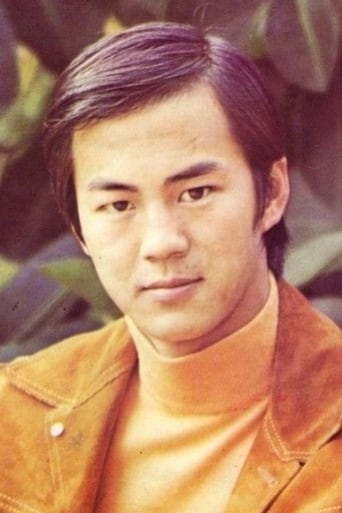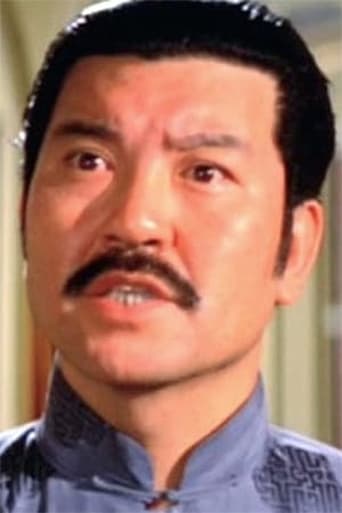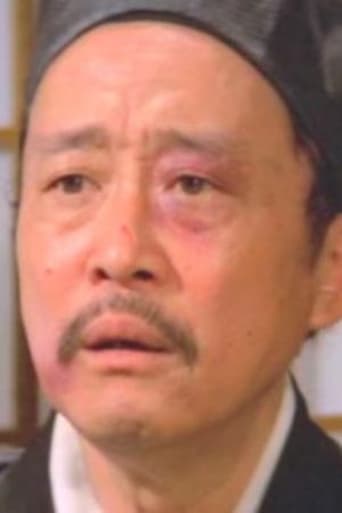Linbeymusol
Wonderful character development!
Supelice
Dreadfully Boring
RipDelight
This is a tender, generous movie that likes its characters and presents them as real people, full of flaws and strengths.
Janae Milner
Easily the biggest piece of Right wing non sense propaganda I ever saw.
dafrosts
Wu Song (Ti Lung) has just killed those who murdered his brother. Now, he faces life in prison. He is more than willing to accept his fate. he is treated well by the guards who escort him to prison. He becomes blood brothers with an inn keeper, Zheng Qing (Wang Kuang-Yu), who knows Wu Song's reputation regarding his strength and how he killed a tiger bare handed. Qing gives Wu Song the clothes of a murdered Monk and promises him a place to stay, if prison should be come too difficult. I wasn't aware you could simply leave prison if it became uncomfortable, but hey, this is Tiger Killer Wu Song we're discussing, so maybe he can just leave prison on a whim. Once in prison, Wu Song is befriended by the Wardon's son Shi En, The Golden Eye (Tien Ching/Tin Ching), who also knows Wu Song's reputation. Wu Song helps Shi En exact revenge on Jiang Zhong/Chang Chun (Chu Mu), who has taken over Delightful Forest (a town similar to Sodom and Gomorrah - not a restaurant as stated in the plot) and mistreated Shi En.Wu Song has no problem helping, so long a he gets 3 bowls of wine at each inn along the way to Delightful Forest. The bowls of wine grow larger with each stop. Wu song is so inebriated by the time they reach the edge of Delightful Forest, Shi En is worried he won't be able to confront Chang Chun. Wu Song isn't worried and tells Shi En to stay put while the problem with Chang Chun is handled.Wu Song makes a disturbance at a Delightful Forest tavern to draw Chang Chun out into the open. It doesn't take long for Wu Song to defeat and totally humiliate Chang Chun. Chang of course vows revenge. He gets help from highly connected friends who set Wu Song up on theft charges. They bribe jail guards to kill Wu Song, but it's blocked by the Captain of the Guards, who is a friend of Shi En's.The 2nd attempt occurs during Wu Song's transfer to prison. Wu Song is quite aware something will be attempted and bides his time. Chang Chun an his cohorts feel Wu Song will no longer be a problem since Wu Song will be chained and bound, therefore, unable to fight back. How little they know of Wu Song's abilities. The assassins are defeated with Wu Song still wearing the chains and a big block of wood.Chang Chun and his cohorts are celebrating Wu Song's death as Wu Song sneaks onto the property. One by one minions and cohorts are killed until there is only Wu Song and Chang Chun. Chang manages to inure Wu Song's arm in the battle before succumbing to his own wounds. Wu Song manages to make it to Zheng Qing's inn to obtain help to recover from his wounds.The movie ends with Wu Song wandering in the monk's garments. This is the character Ti Lung will play in The Water Margin (1972).I gave it an 8 because the story moves along nicely, the plot makes sense and I mean, it's Ti Lung. I'd have given a higher rating if Ti's BBF David Da Wei Chiang also appeared. But, you can't have everything you want, all the time, right?
poe426
Wu Sung (Ti Lung), famous for having killed a tiger with his bare hands (and his adulterous sister and her lover!), avenges himself in a spectacular opening scene before allowing himself to be taken off to jail (his head and hands in a stock-like contraption, a cangue). En route to jail, he's given the opportunity to escape not once but twice, but insists on being taken in so he can pay for his crimes. This is known as Righteousness Plus. At An Ping Fortress (the prison), he's asked by the warden's son to help liberate a gambling den in The Delightful Forest (a village) from strongman Jiang. Wu agrees on the condition that he can have three bowls of wine at each inn and tavern along the way. Though drunk by the time he arrives, Wu handily beats Jiang and Shi En's property is returned to its rightful owner. Wu is then wooed by Jiang's boss and father, Zheng, who proceeds to get him drunk again and frames him for theft. Wu is ambushed and beaten and once again hauled off to prison. Needless to say, there's hell to pay when he sobers up. Ti Lung is at his best here as the righteous Wu Sung, and whether he's using his fists, his feet or a sword, the action is beautifully done throughout and the blood-drenched finale is one of Chang Cheh's best. Lung's final costume suggests that this is a prequel to THE WATER MARGIN. Don't miss it.
Brian Camp
THE DELIGHTFUL FOREST is a real Shaw Bros. gem, a hard-to-find 1972 production from the fabled Hong Kong studio co-directed by Chang Cheh and starring Ti Lung. It is one of a handful of films adapted from "The Water Margin" (aka "Outlaws of the Marsh"), the classic 14th century Chinese martial epic of heroes of the "gallant fraternity," united by their outlaw status, who defend wronged fighters and combat a steady stream of corrupt officials during the Song Dynasty. The protagonist here is Wu Song, the famed constable, known for his superior strength, who killed a rampaging man-killing tiger on Jingyang Ridge and then went on to avenge the murder of his brother by killing his adulterous sister-in-law and her illicit lover. This film picks up the tail end of that story and moves on to adventures arising after being imprisoned for his acts. The events shown in this film are found in Chapters 27-31 of the book (as published in Sidney Shapiro's 1981 translation, Indiana University Press edition).The film opens with Wu Song (Ti Lung) fighting the lover, Ximen Qing (Lau Kar Wing), in a furious kung fu bout and killing him. During his subsequent stay in prison, he is well treated by town boss Shi En (Tien Ching) who hopes that a hero of Wu Song's proportions will agree to help defeat Chiang Chung (Jiang the Gate Guard Giant as named in the book) and get back control of the taverns, gambling houses and brothels in the village of Delightful Forest (Happy Grove in the book). Wu Song agrees, provided he is allowed to have three bowls of wine at every tavern along the way. After defeating the giant (played by Zhu Mu), he is later framed by the villain's allies on a charge of theft. The film closes with Wu avenging himself on those who engineered the frame-up and his flight out of the territory in a monk's guise. Until the final scenes, which perhaps telescope some of the events in the book, it is all a remarkably close adaptation. (The final fight is actually a lot less bloody than the one in the book where Wu Song slaughters General Zhang's entire household: wife, children, servants and maids!)The many fight scenes offer lots of large-scale martial arts action staged by, among others, Lau Kar Leung and his brother Lau Kar Wing. It's all beautifully shot on elaborate Shaw Bros. studio interiors and backlot sets. Ti Lung may seem a bit slight to match the description of the super-strong character as given in the book, but his spirited performance brings the character to glorious life on the screen. Ti was in dozens of kung fu films in the 1970s, many of them classics of the genre, and he gives one of his most energetic and expressive performances here.The big problem with this film, of course, is its rarity. The tape reviewed was a poor-quality dub missing huge portions of the film, particularly at the end. Its total running time was 75 minutes, unlikely for an early 1970s Shaw Bros. costume epic. When the Shaw Bros. films finally get re-released on video and DVD, this is a prime candidate for restoration.ADDENDUM (October 6, 2007): Five-and-a-half years after writing the above review, a restored/remastered letter-boxed version of THE DELIGHTFUL FOREST has come out on Region 3 DVD from Celestial Pictures. It's 92 min. in length, 17 min. longer than the English dub seen for the review. A quick comparison of the action finale as presented in the two versions reveals much of the battle action cut from the English dub. Since doing the original review, I've had the opportunity to see or re-view other Shaw Bros. films based on "The Water Margin" and featuring the main character here, Wu Sung (as the name is spelled in the new subtitles). This film comes after the events depicted in an earlier film, THE AMOROUS LOTUS PAN (1963), but before events depicted in THE WATER MARGIN, made the same year, 1972 (released in English as SEVEN BLOWS OF THE DRAGON). Ti Lung plays Wu Sung in THE DELIGHTFUL FOREST, THE WATER MARGIN and the latter film's direct sequel, ALL MEN ARE BROTHERS (aka SEVEN SOLDIERS OF KUNG FU). He reprised the role ten years later in TIGER KILLER (1982, aka WU SONG), which is actually a prequel to DELIGHTFUL FOREST and depicts the events that caused him to be a prisoner of the state here. THE WATER MARGIN, ALL MEN ARE BROTHERS and TIGER KILLER are all also reviewed on this site. The music track on the original Mandarin-language version of DELIGHTFUL FOREST is very different from that of the English dub. It consists almost entirely of cues lifted from Ennio Morricone's scores for the Sergio Leone films, ONCE UPON A TIME IN THE WEST and DUCK, YOU SUCKER. As a fan of both of those films and owner of their soundtrack albums, I was more than a little distracted by it. Some cues did sound like they were re-orchestrated, though. I did a spot check of the music track on the English dub and found a series of rather choppy cues from a very odd music library with lots of incongruous electric guitar riffs. So I guess I'll settle for the Morricone.




